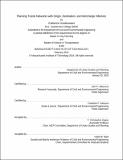Planning transit networks with origin, destination, and interchange inference
Author(s)
Vanderwaart, Catherine (Catherine Elizabeth)
DownloadFull printable version (9.121Mb)
Other Contributors
Massachusetts Bay Transportation Authority.
Advisor
John P. Attanucci and Frederick P. Salvucci.
Terms of use
Metadata
Show full item recordAbstract
The institutional and financial circumstances at many transit agencies significantly constrain the bus planning process. Long-term planning focuses on major infrastructure projects, while short-term planning focuses on scheduling and minor service adjustments. Medium-range bus planning is given limited attention in many agencies, especially those with significant capacity constraints. Recent research has developed a new method of assembling data that has the potential to be very useful to service planners: origin, destination, and interchange inference (ODX), which uses farecard and vehicle location data to provide a previously unavailable level of geographically precise disaggregate data on passengers' linked trips. This research develops a framework for using ODX for medium- to long-range bus planning. It proposes a service planning process that targets limited resources at the areas that need them most. It develops tools and methods for using ODX data to design and evaluate realistic, practical, and incremental service changes to improve accessibility to key parts of the agency's service area. The process has five phases: identification of target locations, analysis of those locations, development of proposed service changes, evaluation of those proposals, and post-implementation review. Several case studies are presented using data from the Massachusetts Bay Transportation Authority (MBTA), the transit agency for the Boston region. First, three target locations in the MBTA service area are analyzed. Service changes that would improve access to each of these locations are proposed and evaluated, including additional frequency on an existing route, the creation of a new route, and extensions of two existing routes. ODX and related data are used to analyze each proposal in detail in a process that can be replicated by other agencies with similar data.
Description
Thesis: M.C.P., Massachusetts Institute of Technology, Department of Urban Studies and Planning, 2016. Thesis: S.M. in Transportation, Massachusetts Institute of Technology, Department of Civil and Environmental Engineering, 2016. This electronic version was submitted by the student author. The certified thesis is available in the Institute Archives and Special Collections. Cataloged from student-submitted PDF version of thesis. Includes bibliographical references (pages 169-175).
Date issued
2016Department
Massachusetts Institute of Technology. Department of Civil and Environmental Engineering; Massachusetts Institute of Technology. Department of Urban Studies and PlanningPublisher
Massachusetts Institute of Technology
Keywords
Urban Studies and Planning., Civil and Environmental Engineering., Massachusetts Bay Transportation Authority.